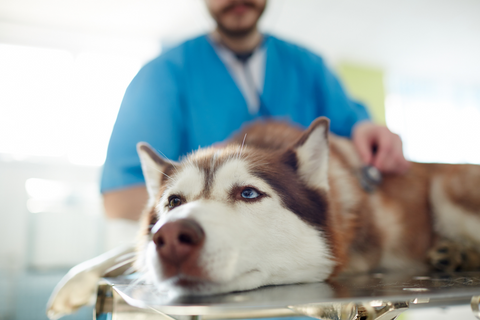

· By Curtis Hacon
Bloody Dog Poop: A Veterinary Emergency?
Updated on May 10, 2023
Bloody dog poop can be scary. But is it really a veterinary emergency? Keep reading because we explain everything step by step, so you know what to do if you see blood in your dog's poop.
Is Blood In Dog Poop A Veterinary Emergency?
Bloody dog poop can be a veterinary emergency. This doesn't mean that seeing blood in your dog's poop always indicates a serious health problem. But it could be.
In a nutshell, bloody dog poop is alarming, and you should call your trusted vet as soon as possible.
How Does Blood Look Like In Dog Stool?
Get ready to embark on an engaging journey where every stool tells a tale, and where the enigma of blood becomes a canine detective's best-kept secret.
1. Bright Red Blood In Dog Poop
Hematochezia is bleeding in the lower digestive tract (in the colon, rectum, or anus). In general, the dog usually has diarrhea in these cases. You will notice this because of the number of times he evacuates his intestines. Also, the poop is soft or has liquid consistency.
2. Bloody Back Jelly Stool
It looks dark and sticky. That indicates that the blood has been digested; therefore, the problem may be in the upper digestive tract (the stomach or small intestine). The presence of blood in canine poop from the upper part of the digestive tract is called melena.
_________________________Are you still using plastic bags to pick up your dog's poop? These take around 50 years to degrade. Better use compostable poop bags.Discover here why you should use compostable poop bags
_________________________
⭐ Tip To Check The Color Of Blood In Dog Poop ⭐
If you're unsure if the blood looks bright red or dark red (black), you can wipe your dog's poop with a tissue or toilet paper.
Once you remove it, you will be able to appreciate the color of the blood to inform the vet by phone.
Why Is My Dog Pooping Just Blood?
In some cases, your dog may poop only blood. It occurs when the gut is empty. Another option is that your pup suffers from such strong diarrhea that the poop is not appreciated, but only the blood.
Bloody Dog Poop: When Should I Go to the Vet?
Whenever you notice the presence of blood in your dog's poop, you should call the vet. He will decide if you should go to the consultation and when.
Also, pay attention to your dog and go to the vet urgently if your furry friend:
- Looks lethargic.
- Is weak.
- He has pale gums.
- Vomits.
- Doesn't want to drink water or eat.
- Becomes unresponsive.
Possible 13 Main Causes Of Blood In Dog Stool
1. Colitis
2. Parasites (worms, for example)
3. Toxins
4. Trauma
5. Infections
6. Ulcers
7. Reaction to some medications
8. Hemorrhoids
9. Inflammatory bowel disease
10. Other inflammatory disorders
11. Hormonal problems
12. Foreign bodies
13. Tumors
Cause Of "False" Bloody Dog Poop 🍒
If your dog ate something that could stain his stool, such as beets or red-dyed treats, his dog can look "red". In this case, there is no actual blood present in the poop.
What Is The Treatment For Blood In Stool In Dogs?
Treatment will depend on the cause. First, the veterinarian will examine your pup. This examination will allow him to narrow down the list of possible causes.
Then, the vet may do other tests such as blood, urine, and poop tests, ultrasounds, and x-rays.
The results of the tests will allow a diagnosis and, therefore, an adequate treatment.
Treatment can range from a diet change and medications to support your dog's gut, such as probiotics, antacids, and antibiotics, to hospitalization and more intensive treatments, like surgery.
Can A Dog Die From Pooping Blood?
Unfortunately, yes. This can happen if you lose too much blood or if you also vomit, which along with diarrhea accelerate fluid loss.
Think of it this way: blood loss can lead to anemia, but coupled with severe dehydration, your dog can go into shock.
The most serious cases of blood in dog poop can cause organ damage, breathing problems and even death.
For this reason, if you see blood in your dog's poop, consult your trusted vet immediately.
FAQ

What Can I Give My Dog For Bloody Stool?
You should not self-medicate your dog if you find blood in his poop. Call the vet immediately. Blood loss can be an indicator of health problems that require veterinary treatment.
What Color Is Blood In Dog Poop?
Why Would A Dog Have Bloody Diarrhea?
The causes can be multiple, but among them are:
- Hemorrhagic gastroenteritis (HGE)
- Stomach ulcers.
- Viral infection.
- Bacterial infection.
- Irritable bowel syndrome.
- Hemorrhoids.
